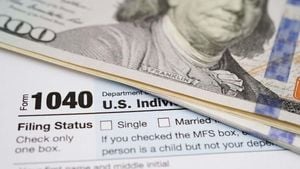The recent German federal elections marked a significant shift in the country's political climate, highlighting new challenges and opportunities following the end of Angela Merkel's long-standing leadership. From voter turnout to the rise of smaller parties, the outcomes have left analysts with much to discuss. Here are seven key takeaways from the elections held on September 26, 2021.
First and foremost, the elections signal the end of Merkel's era, which has lasted nearly 16 years. Angela Merkel, who previously held the chancellorship since 2005, decided not to seek re-election, paving the way for new leaders. According to political analyst sources, "This election marks the end of Angela Merkel's era and sets the stage for new leadership," emphasizing the historical significance of this transition. The chancellorship has now gone to Olaf Scholz from the Social Democratic Party (SPD), which reflects not only party allegiance but also the broader shift toward progressive governance.
Another notable point is the remarkably high voter turnout, which exceeded expectations. Election observers reported, "Voter turnout was significantly higher than expected, indicating increasing public engagement." This trend signals the German populace's growing interest and investment in their political futures, which could reshape party strategies moving forward.
Adding to the intrigue is the rise of smaller parties, such as the Greens and the Free Democratic Party (FDP). This phenomenon reflects changing attitudes among voters who are increasingly seeking alternatives to the traditional major parties, the SPD and the Christian Democratic Union (CDU). According to political commentators, "The rise of smaller parties reflects changing attitudes among the electorate," indicating more diverse political representation may soon emerge within the Bundestag.
Another significant takeaway revolves around potential coalition dynamics. The SPD is likely to need partners to form a government, as they did not secure enough seats to govern alone. This opens discussions about possible coalitions with the Greens and FDP, which share some progressive policies but differ on economic issues. Speculations abound on how these parties could negotiate terms and align their agendas, shaping future policies.
Voting trends across geographical areas also reveal interesting insights. Urban areas, which typically lean more left-leaning, showed stronger support for the Greens and SPD, whereas rural areas mostly favored the CDU. The differences highlight how local issues can influence national elections, providing invaluable lessons for political strategists heading forward.
Lastly, the election results do not just impact Germany but also signal shifts within the European Union (EU). With several major European powers dealing with similar political realignments, the outcomes could affect EU policies, especially concerning climate change and immigration. Political analysts note the potential for Germany to take on new roles within the EU, fostering greater collaboration or contention based on the newly elected coalition's stance.
These seven takeaways from the 2021 German federal elections instill the belief of significant political evolution. From the rightful end of one era to the advent of new political dynamics, the elections set the stage for the possibility of transformative change. The coming months will confirm whether these shifts will translate to productive governance or lead to heightened political discord.



